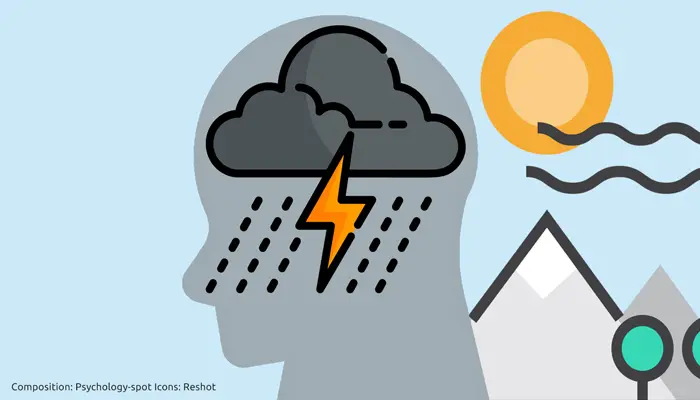
“To weep is to make less the depth of grief,” wrote William Shakespeare. And he was not wrong. However, there are circumstances in which we are not allowed to express our grief, frustration, or anger at the loss. In those cases we develop a silent grief.
Losing a loved one or a pet can cause excruciating pain. That pain is mitigated a bit when we can express it or share it with other people. In fact, one of the main psychological functions of funeral rites is to accompany the mourners to provide them with the support and emotional validation they need. When instead of support we receive indifference, we can feel compelled to repress our emotions and feelings by working through the grief alone.
When does a silent grief take place?
Silent grief is one in which we feel compelled to hide our emotions and carry our pain alone because the people around us, either implicitly or explicitly, are not receptive to our suffering.
The problem is that when pain is not shared or expressed, it is likely to end up encysting. For this reason, silent pains can end up being non-elaborate pains that accompany us for much longer than is recommended for our mental balance.
The disenfranchised grief, as it is also known, makes us feel lonely and misunderstood, without supports to hold on to as we go through a particularly difficult time from an emotional point of view, so it is not strange that we end up developing depression.
The 3 main situations that disenfranchise the grief
1. Circumstances silence the grief
There are circumstances in which we are forced to hide our pain or vulnerability. In fact, we cannot forget that our society lives most of the time with its back to death and loss, in a hurry to turn the page and return to “normality”. We share a generalized culture of avoidance, minimal ritual, and repressed grief in which fortitude is exalted at the cost of sadness. That can make many people not know what to do with their feelings because they feel compelled to move on.
Many of the Covid deaths that have occurred in the past year, for example, have led to a silent grief. Death has become a reality more omnipresent than ever, but also more eluded due to the impossibility of performing the funeral rituals that provide us support and comfort. That has made the pain not express itself, getting trapped in individual solitudes. In fact, people who lose a loved one due to suicide, a subject that remains taboo in our culture, are also more likely to develop disenfranchised grief as they do not find support from others to share their suffering from the loss.
2. Lack of sensitivity from close people
In most cases, silent grief is caused by a lack of sensitivity from those close to you. A child who has lost a parent refused by the other, for example, will find it difficult to show his or her grief at home. A person who is on the other side of the world where the loss occurred may also have trouble expressing his or her pain in the environment where he or she is because he or she does not receive the understanding and support needed.
The loss of a pet also leads to disenfranchised grief, because the people around us do not understand such deep pain and encourage us to turn the page as soon as possible. There are many other losses that have to be lived in silence, because they do not generate emotional resonance in those around us, such as the loss of a pregnancy, the failure of a professional project or the loss of a job.
In these cases, the most common is that the people around us assume two attitudes: encourage us to turn the page or walk away. When they tell us “Now it’s over, don’t cry anymore” or “Be strong, he/she wouldn’t like to see you like this”, the message that comes to us is that our pain is not understood. Other people may decide to walk away thinking that this will make them less of a nuisance, but in this way they leave us alone with our suffering.
3. Problems expressing emotions
Sometimes the silent grief is not due to our environment but to the education we received. “Our society is very concealing and denies suffering, which definitely does not contribute to overcoming it,” wrote journalist Susana Roccatagliata after losing one of her children.
Many people grown up with messages from their parents and authority figures that disallow the expression of emotions and believe that showing their suffering and vulnerability is a negative thing. In a situation of loss, they resort to repressive role models of emotions, hiding what they really feel. They force themselves to convey an image of strength and security when they are falling apart waving inside. If we ask them how they are, they will respond “good” avoiding the matter, so that they close themselves to any outside help and live a silent grief.
The antidote: listening and accompaniment
Overcoming a loss, whatever it is, is difficult, trying to overcome it alone can be a daunting task that leaves us strengthless. Faced with a disenfranchised grieving situation, we need to find listening and support. As Christine Longaker wrote: “If you can listen and accept me, without trying to change or fix my mood, I will eventually get over it and be able to relax, and perhaps even laugh with you again”.
If in our circle of trust we do not have a person who can listen to us, we can look for a support group. Emotional validation can work miracles, facilitate acceptance, and give us a more objective perspective on the situation.
When people can express themselves freely and someone listens to them in a respectful way, without judgment or haste, there is a “rearrangement” of the feelings and thoughts related to the loss, so that they can continue to advance in the grieving process until reaching the full recovery.
That person does not usually need advice, sermons, or recipes to solve his or her situation, but just a little time and understanding to heal. Talking about memories is a way to purify the past and accept feelings and the new reality.



